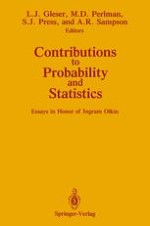1989 | OriginalPaper | Buchkapitel
Minimum Majorization Decomposition
verfasst von : Joseph S. Verducci
Erschienen in: Contributions to Probability and Statistics
Verlag: Springer New York
Enthalten in: Professional Book Archive
Aktivieren Sie unsere intelligente Suche, um passende Fachinhalte oder Patente zu finden.
Wählen Sie Textabschnitte aus um mit Künstlicher Intelligenz passenden Patente zu finden. powered by
Markieren Sie Textabschnitte, um KI-gestützt weitere passende Inhalte zu finden. powered by
A famous theorem of Birkhoff says that any doubly stochastic matrix D can be decomposed into a convex combination of permutation matrices R. The various decompositions correspond to probability distributions on the set of permutations that satisfy the linear constraints E[R] = D. This paper illustrates how to decompose D so that the resulting probability distribution is minimal in the sense that it does not majorize any other distribution satisfying these constraints.Any distribution maximizing a strictly Schur concave function g under these linear constraints will be minimal in the above sense (Joe (1987)). In particular, for D in the relative interior of the convex hull of the permutation matrices, the probability functions p that maximize $$g\left( p \right)\, = \, - \,\sum\nolimits_\pi {p\left( \pi \right)} \,$$ log p(π), subject to E[R] = D, form an exponential family £ with sufficient statistic R.This paper provides a theorem that characterizes the exponential family £ by a property called quasi-independence. Quasi-independence is defined in terms of the invariance of the product measure over Latin sets. The characterization suggests an algorithm for an explicit minimal decomposition of a doubly stochastic matrix.
